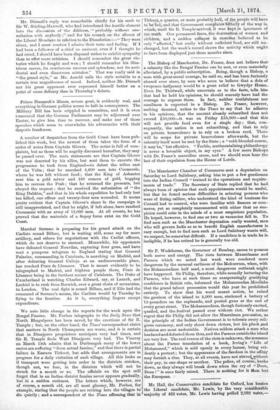The Bishop of Manchester, Dr. Fraser, does not believe that•
a calamity like the Bengal Famine can be met, or even materially alleviated, by a public subscription. Being, though a Bishop, a man with great moral courage, he said so, and has been furiously abused ever since, by men who seem to believe that a dole of twopence-halfpenny would be a great relief to Gwydyr House. Even Dr. Thirlwall, while uncertain as to the facts, tells him that had he held his opinions, he should scarcely have had the courage to express them. In fact, neither truthfulness nor- manliness is expected in a Bishop. Dr. Fraser, however,. nothing daunted, writes to the Times to say that he adheres to his opinions, that the amount already subscribed does not exceed £50,000—it was on Friday £55,000—and that this will not provide food even for a single day ; that, con- sequently, the nation is not subscribing, and that to rely- on private benevolence is to rely on a broken reed. There will be scope for private benevolence afterwards, but the calamity itself must be met by the State ; a "cold-blooded course, it may be," but effective. " Feeble, sentimentalising philanthropy- is never a loveable object, in my eyes." A few more Bishops. with Dr. Fraser's masculine sense, and we should soon hear the last of their expulsion from the House of Lords.






































 Previous page
Previous page